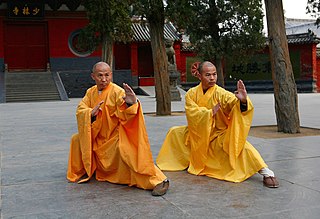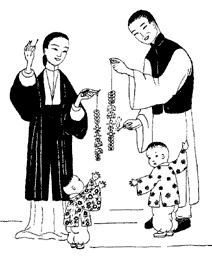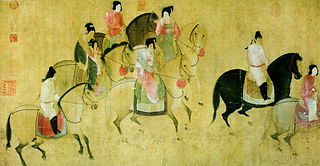
Prayer is an invocation or act that seeks to activate a rapport with an object of worship through deliberate communication. In the narrow sense, the term refers to an act of supplication or intercession directed towards a deity, or a deified ancestor. More generally, prayer can also have the purpose of thanksgiving or praise, and in comparative religion is closely associated with more abstract forms of meditation and with charms or spells.

The Temple of Heaven is an imperial complex of religious buildings situated in the southeastern part of central Beijing. The complex was visited by the Emperors of the Ming and Qing dynasties for annual ceremonies of prayer to Heaven for a good harvest.

The Mid–Autumn Festival, also known as Moon Festival or Mooncake Festival, is a traditional festival celebrated by many East and Southeast Asian people. It is the second-most important holiday after the Chinese New Year with a history dating back 3,000 years, when China's emperors worshipped the moon for bountiful harvests. The celebration is called Chuseok in Korea and Tsukimi (moon-viewing) in Japan.

Northern Praying Mantis is a style of Chinese martial arts, sometimes called Shandong Praying Mantis after its province of origin. It was created by Wang Lang (王朗) and was named after the praying mantis, an insect, the aggressiveness of which inspired the style. One Mantis legend places the creation of the style in the Song Dynasty when Wang Lang was supposedly one of 18 masters gathered by the Abbot Fu Ju (福居), a legendary persona of the historical Abbot Fu Yu (福裕) (1203–1275), to improve Shaolin martial arts. However, most legends place Wang Lang in the late Ming Dynasty.

The Qingmingfestival, also known as Tomb-Sweeping Day in English, is a traditional Chinese festival observed by the Han Chinese of mainland China, Taiwan, Hong Kong, Macau, Malaysia, Singapore, Indonesia, Thailand and by the Chitty of Malaysia and Singapore. It falls on the first day of the fifth solar term of the traditional Chinese lunisolar calendar. This makes it the 15th day after the Spring Equinox, either 4, 5 or 6 April in a given year. During Qingming, Chinese families visit the tombs of their ancestors to clean the gravesites, pray to their ancestors and make ritual offerings. Offerings would typically include traditional food dishes and the burning of joss sticks and joss paper. The holiday recognizes the traditional reverence of one's ancestors in Chinese culture.

The Chinese mantis is a species of mantis native to Asia and the nearby islands. In 1896 this species was accidentally introduced by a nurseryperson at Mt. Airy near Philadelphia, United States. Tenodera sinensis often is erroneously referred to as Tenodera aridifolia sinensis because it was at first described as a subspecies of Tenodera aridifolia, but Tenodera sinensis is now established as a full species.

Southern Praying Mantis is a Chinese martial art originating with the Hakka people. It is most closely associated with styles such as Southern Dragon Kung Fu and Bak Mei.

An ootheca is a type of egg mass made by any member of a variety of species including mollusks, mantises, and cockroaches.

Tai'an is a prefecture-level city in Western Shandong Province of the People's Republic of China. Centered on Mount Tai, the city borders the provincial capital of Jinan to the north, Zibo to the east, Linyi to the southeast, Liaocheng to the extreme west and Jining to the south. To the west, Tai'an is separated from the province of Henan by the Yellow River.

Zhang Xuan (713–755) was a Chinese painter who lived during the Tang Dynasty (618–907).

Xi Shengmo also known as Pastor Hsi, was a Chinese Christian leader.
Tu'er Shen or Tu Shen, is a Chinese deity who manages love and sex between homosexual people. His name literally means "rabbit deity". His adherents refer to him as Ta Yeh.

Dōtaku (銅鐸) are Japanese bells smelted from relatively thin bronze and richly decorated.

The Manchurian revival of 1908 was a Protestant revival that occurred in churches and mission stations in Manchuria.
Fan Wen was the King of Champa from 336 to 349. Fan Wen was the commander in chief to Fan Yi, and, after Fan Yi's death in 336, he seized the throne. In 340, he sent an embassy to China to request the province of Jiaozhi. His request was denied, and so Fan Wen recaptured Rinan in 347. He died two years later on another campaign.

Prays is a genus of moths of the family Plutellidae.

Mantises are an order (Mantodea) of insects that contains over 2,400 species in about 430 genera in 30 families. The largest family is the Mantidae ("mantids"). Mantises are distributed worldwide in temperate and tropical habitats. They have triangular heads with bulging eyes supported on flexible necks. Their elongated bodies may or may not have wings, but all Mantodea have forelegs that are greatly enlarged and adapted for catching and gripping prey; their upright posture, while remaining stationary with forearms folded, has led to the common name praying mantis.

Thian Fah Foundation Hospital, shortened to Thian Fah Foundation is the first foundation and private hospital in Thailand, including shrine. Located at 606 Yaowarat Road, Samphanthawong Subdistrict, Samphanthawong District, Bangkok near Wat Traimit, Odeon Circle and Chaloem Buri Intersection.
Zhù is a Chinese surname., meaning ‘wizard’, ‘prayers’, or ‘to pray’ in ancient Chinese. The origin of the name is either from Zhu (祝), an official post in ancient China in charge of chanting prayers during religious worship, or (ii) from Zhu (祝), the name of a fief located in modern-day Shandong province during the reign of King Wu of Zhou. According to a 2013 study, it was the 138th-most common surname in China, shared by 1,20,000 people or 0.090% of the population, with the province with the most being Zhejiang.














